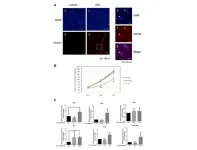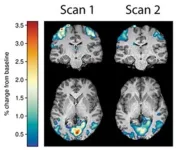(Press-News.org) Results of a qualitative research study into the uptake of PrEP - a drug which stops HIV infecting the body - suggests that more needs to be done to breakdown barriers to access for the potentially lifesaving medication.
Research published in the Journal of Prevention and Health Promotion from a team at the University of Bath finds that knowledge and awareness among young men who have sex with other men about the drug is low and there is often stigma associated with being prescribed PrEP.
Pre-exposure prophylaxis ‘PrEP’ refers to a pill that prevents HIV contraction in HIV-negative individuals. PrEP can be taken daily or on-demand a day before and for two days after sex. When taken as prescribed it is 99% effective at preventing HIV transmission. Since March 2020, PrEP has also been available for free on the NHS for those at high risk of HIV.
PrEP Awareness Week and WAD23
The latest study is published during PrEP Awareness Week and on World Aids Day (Friday 1 December). It comes at a time when concerns over access to the drug, as well as HIV treatment, have been in the news.
On Thursday, results of a large-scale PrEP Impact Trial involving 24,000 PrEP users published in The Lancet suggested the drug was highly effective as a preventative treatment. On Wednesday, musician Sir Elton John spoke in Parliament urging ministers to do more to hit the target of eliminating new HIV cases by 2030.
Despite higher risks of contracting HIV, uptake of PrEP among young men who have sex with other men is low in the UK. This latest study from researchers at Bath investigated why this was the case through in-depth interviews with a small sample of young men aged between 18 – 22.
Their study highlights barriers to uptake identified by those most at risk of contracting HIV and who could benefit from the treatment. These included a lack of a perceived necessity to take PrEP, a lack of general knowledge about the drug – what it is and how it works; as well as discomfort in getting hold of the drug.
Anonymous responses from participants highlighted specific challenges. For example, some men felt that taking PrEP was unnecessary:
I always just engaged in safe sex so it’s like, do I need this added preventative measure if I’m already sort of like I’m doing what I should be doing?
Others saw STI screening as a solution, without considering the possibility of contracting HIV in between testing. Participants often lacked a full picture of why and how they might use PrEP, and suggested finding it difficult to access detailed information:
I didn’t know if I really needed it, like there wasn’t really advertisements or like actual people or like poster advertisements telling me that I probably need PrEP.
Regarding access to PrEP, participants also referred to awkward consultations with GPs or sexual health clinics where requesting PrEP had a perceived stigma attached:
Being in person with them and they say something awkward, and you just have to sort of sit there and then leave awkwardly it’s a lot more intense.
The researchers’ analysis backs up a recent government review which suggests that a large proportion of young men who could be taking PrEP are not.
Against this backdrop, the researchers think more could and should be done to increase access to the drug, including through the implementation of new online services and increased education.
Dr Richard Hamshaw from the University of Bath’s Department of Psychology supervised the research. He said: "Given the roll-out of PrEP, we were keen to gather views from one of the more at-risk groups (and most targeted group for PrEP uptake), young men who have sex with men.
"Carrying out in-depth interviews meant our participants could share their stories and experiences with us, and we were able to build a more detailed picture as to why some people might not use PrEP. We hope that our paper sheds further light on barriers to PrEP uptake, and hope to explore this further in future projects."
First author Loukas Haggipavlou added: “I started researching PrEP uptake after I noticed a worrying number of my LGBT+ friends were relatively unaware of the drug. Following this study, we propose enhancing such awareness by promoting stories from PrEP users about its consumption and benefits, coupled with integrating PrEP discussions into sex education in schools.
"To further increase uptake amongst young men who have sex with men, we also recommend the implementation of new online services for PrEP acquisition, to simplify the process, destigmatise and increase access."
END
Study identifies barriers that limit young men at HIV risk from taking preventative drug
University of Bath Press Release
2023-12-01
ELSE PRESS RELEASES FROM THIS DATE:
New project investigating how aerosols could affect climate change in near future
2023-12-01
A researcher from The University of Texas at Austin has received a grant from the National Oceanic and Atmospheric Administration (NOAA) to study how changing aerosol pollution could influence climate change in the United States in the coming decades.
Aerosols are tiny solid particles and liquid droplets that contribute to smog and are emitted from industrial factories, power plants and vehicle tailpipes, as well as natural sources like volcanic eruptions. These small particles can influence the Earth’s climate by reflecting or absorbing sunlight and changing the behavior of clouds.
Geeta ...
Physicians, scientists agree increased East-West travel has negative impacts on student-athletes through sleep and circadian disruption
2023-12-01
Announcements in June 2022 of possible realignments of major east-west athletic conferences raised concern among many sleep and circadian physicians and scientists across the United States. As a result of such changes, student-athletes would suffer the negative consequences of increased travel—especially with travel that that crosses time zones and induces jet lag.
Because of the concern over the demise of the Pac12, leading to more east-west trips, a group of sleep and circadian scientists and physicians have published a white paper ...
Arizona State, Idaho National Laboratory team to boost clean energy research
2023-12-01
Idaho National Laboratory (INL) and Arizona State University (ASU) have agreed to expand their joint efforts in clean energy research for the next five years. An agreement signed in October establishes a framework for both institutions to develop low-carbon processes for the energy and manufacturing sectors.
One joint project works to improve and decarbonize methods to extract critical minerals needed for renewable energy generation, energy storage and high-tech electronics. Another effort will develop solutions to electrify process heating, a major pathway to decarbonizing heavy manufacturing.
Researchers from INL and ASU have previously ...
New bottlenose dolphin sense discovered: they feel electricity
2023-12-01
Born tail first, bottlenose dolphin calves emerge equipped with two slender rows of whiskers along their beak-like snouts – much like the touch-sensitive whiskers of seals. But the whiskers fall out soon after birth, leaving the youngster with a series of dimples, known as vibrissal pits. Recently Tim Hüttner and Guido Dehnhardt, from University of Rostock, Germany, began to suspect that the dimples may be more than just a relic. Could they allow adult bottlenose dolphins to sense weak electric fields? Taking an initial close look, they realised that the remnant pits resemble ...
Genomic study sheds light on how carnivorous Asian pitcher plants acquired signature insect trap
2023-11-30
BUFFALO, N.Y. — Possessing more than two complete sets of chromosomes can be a hindrance to long-term survival of a plant lineage, yet scientists are also finding evidence it’s likely behind some evolutionary innovation.
Sudden inheritance of whole suites of extra gene copies can add redundancy to an organism's regular sets of functions, actually permitting some of those copies to evolve and express in entirely new ways.
In the case of the East Asian pitcher plant, this mutational freedom may have even fine-turned its ability to capture prey and satisfy its appetite for “meat.”
That’s just one of the findings ...
Harnessing the power of a parasite that can stop pain
2023-11-30
COLUMBUS, Ohio – For the first time, scientists have begun to figure out why the disfiguring skin lesions caused by cutaneous leishmaniasis don’t hurt.
Researchers analyzed leishmaniasis lesions on mouse skin to detect metabolic signaling pathways that differed from uninfected mice. Results suggested the parasites that cause the disease change pain perception – presumably as a way to delay treatment and promote their own survival.
“No one knows why these lesions are painless – ...
Aging modulates extracellular vesicles of epidermal keratinocytes
2023-11-30
“In this article, we describe for the first time the impact of chronological aging on EVs production by human keratinocytes.”
BUFFALO, NY- November 30, 2023 – A new research paper was published on the cover of Aging (listed by MEDLINE/PubMed as "Aging (Albany NY)" and "Aging-US" by Web of Science) Volume 15, Issue 22, entitled, “Chronological aging impacts abundance, function and microRNA content of extracellular vesicles produced by human epidermal keratinocytes.”
The disturbance of intercellular communication is one of the hallmarks of aging. In their new study, researchers ...
Center for BrainHealth publishes new model to predict improvement in brain health
2023-11-30
As part of its ongoing quest to advance better brain health and performance, new research led by Center for BrainHealth at The University of Texas at Dallas investigated neural biomarkers associated with improvements on a brain health index.
The study, “Toward Precision Brain Health: Accurate Prediction of a Cognitive Index Trajectory Using Neuroimaging Metrics,” was recently published in Cerebral Cortex
A total of 48 participants aged 21–65 completed a simple task during a functional magnetic resonance imaging (fMRI) session, then once ...
Scientists find gene therapy reduces liver cancer in animal model
2023-11-30
Researchers at UC Davis Comprehensive Cancer Center have shown that inhibiting a specific protein using gene therapy can shrink hepatocellular carcinoma (HCC) in mice. Silencing the galectin 1 (Gal1) protein, which is often over-expressed in HCC, also improved the anti-cancer immune response and increased the number of killer T cells inside tumors. The study was published in Acta Pharmaceutica Sinica B.
“We’ve long known that Gal1 is a biomarker for hepatocellular carcinoma,” said ...
Air Force awards UTEP Grant to safeguard assets in space
2023-11-30
EL PASO, Texas (Nov. 30, 2023) – Space near earth is teeming with objects, whether natural, like meteors and comets, or manmade, like satellites, spacecraft and rocket debris. But experts still need a clearer picture of the location and state of these objects, which can threaten space-based assets, such as GPS, weather-monitoring and communication satellites.
“The United States is dependent economically and militarily on space assets,” said Miguel Velez-Reyes, Ph.D., chair of the Electrical and Computer Engineering Department at The University of Texas at El Paso. “For ...
LAST 30 PRESS RELEASES:
Brainwaves of mothers and children synchronize when playing together – even in an acquired language
A holiday to better recovery
Cal Poly’s fifth Climate Solutions Now conference to take place Feb. 23-27
Mask-wearing during COVID-19 linked to reduced air pollution–triggered heart attack risk in Japan
Achieving cross-coupling reactions of fatty amide reduction radicals via iridium-photorelay catalysis and other strategies
Shorter may be sweeter: Study finds 15-second health ads can curb junk food cravings
Family relationships identified in Stone Age graves on Gotland
Effectiveness of exercise to ease osteoarthritis symptoms likely minimal and transient
Cost of copper must rise double to meet basic copper needs
A gel for wounds that won’t heal
Iron, carbon, and the art of toxic cleanup
Organic soil amendments work together to help sandy soils hold water longer, study finds
Hidden carbon in mangrove soils may play a larger role in climate regulation than previously thought
Weight-loss wonder pills prompt scrutiny of key ingredient
Nonprofit leader Diane Dodge to receive 2026 Penn Nursing Renfield Foundation Award for Global Women’s Health
Maternal smoking during pregnancy may be linked to higher blood pressure in children, NIH study finds
New Lund model aims to shorten the path to life-saving cell and gene therapies
Researchers create ultra-stretchable, liquid-repellent materials via laser ablation
Combining AI with OCT shows potential for detecting lipid-rich plaques in coronary arteries
SeaCast revolutionizes Mediterranean Sea forecasting with AI-powered speed and accuracy
JMIR Publications’ JMIR Bioinformatics and Biotechnology invites submissions on Bridging Data, AI, and Innovation to Transform Health
Honey bees navigate more precisely than previously thought
Air pollution may directly contribute to Alzheimer’s disease
Study finds early imaging after pediatric UTIs may do more harm than good
UC San Diego Health joins national research for maternal-fetal care
New biomarker predicts chemotherapy response in triple-negative breast cancer
Treatment algorithms featured in Brain Trauma Foundation’s update of guidelines for care of patients with penetrating traumatic brain injury
Over 40% of musicians experience tinnitus; hearing loss and hyperacusis also significantly elevated
Artificial intelligence predicts colorectal cancer risk in ulcerative colitis patients
Mayo Clinic installs first magnetic nanoparticle hyperthermia system for cancer research in the US
[Press-News.org] Study identifies barriers that limit young men at HIV risk from taking preventative drugUniversity of Bath Press Release




